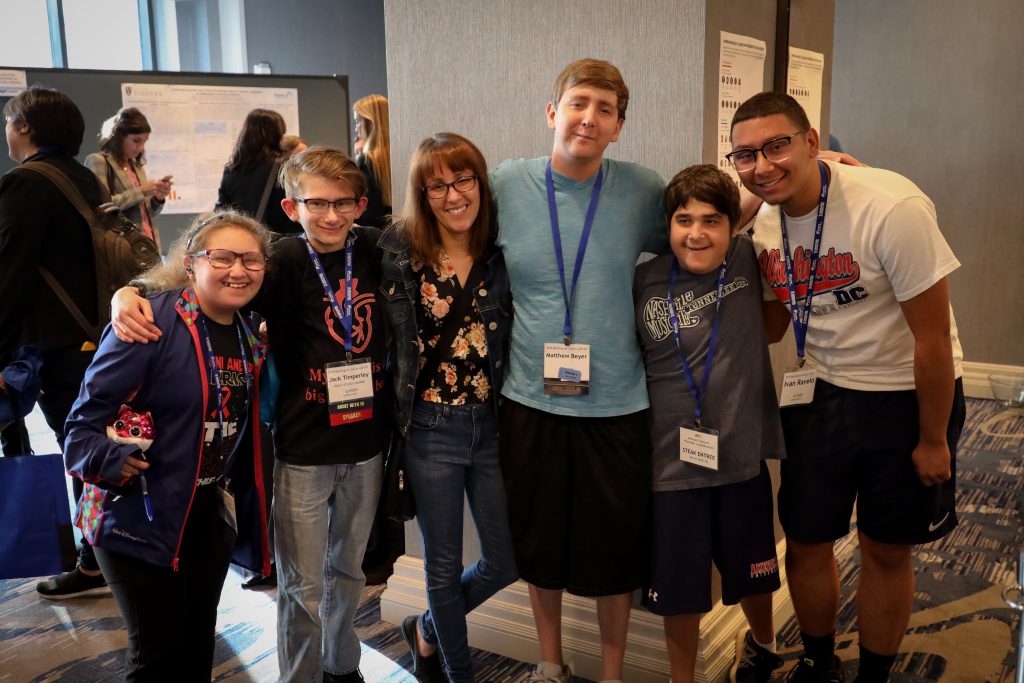The Latest on FA Research
Research is the answer to one day making FA a treatable, manageable disease.
On this page you’ll find the latest updates on FARF-funded research and activities. Each quarter, we’ll update this list with our newly funded grants, projects and initiatives, events, and other research milestones or opportunities.
These advancements are made possible thanks to our incredible donors, fundraisers, and dedicated researchers. Click here to make a gift to support research today.
Last updated: October 5, 2023
New Projects Awarded in 2023
Cancer Therapeutics
Clinical trial to investigate the safety and efficacy of Afatinib when administered as therapy in FA patients
Investigators: Jordi Surrallés, PhD; Ramon Garcia Escudero, PhD
Institution: Sant Pau Hospital Research Institute, Spain; Research Institute of the Hospital 12 de Octubre, Spain
Amount awarded: $324,733
Individuals with FA have a higher risk of developing head and neck squamous cell carcinoma (HSNCC) at young ages. Long-term survival rates remain low because often these individuals cannot tolerate conventional chemotherapy and radiation treatments due to toxicity-related issues. This study is the first clinical trial for investigating a potential therapy for FA-related HNSCC. It will investigate the efficacy and safety of the drug Afatinib when administered to people with FA who are diagnosed with unresectable and/or advanced squamous cell carcinoma of the oral cavity, oropharynx, hypopharynx, or larynx.
Gene Therapy and Gene Editing
Development of in utero therapies for Fanconi anemia
Investigators: Agnieszka Czechowicz, MD, PhD
Institution: Stanford University
Amount awarded: $250,000
Correcting FA mutations in all cells of the body may prevent issues such as bone marrow failure and cancer in people with FA. Since mutations in FA genes start during the gestational process, the ideal time to correct genes may be in utero. The goal of this study is to use laboratory-based experiments to determine whether gene editing in utero (during gestation) can correct FA gene variants in various tissues of the body.
Data Interoperability
Building a Fanconi Anemia Data Commons
Investigator: Sam Volchenboum, MD, PhD, MS
Institution: University of Chicago
Amount awarded: $315,962
Studying a rare disease such as Fanconi anemia is challenging: data must be captured from as many treatment locations as possible. No single institution can have a breakthrough; it requires sharing as much data as possible from as many individuals as possible. Since 2015, Data for the Common Good (D4CG) has been building data commons based on the latest technological breakthroughs and leading international efforts to improve pediatric cancer and rare disease research through better data collection and storage. Through this grant funding, D4CG – in partnership with FARF and other worldwide stakeholders – will establish the world’s first Fanconi anemia data commons by collecting data from registries in North America, Europe, and other parts of the world and harmonizing those data to a new international consensus standard, allowing the information to be combined and shared for research and discovery.
Projects that Wrapped Up in 2023
Bone Marrow Failure
Understanding Clonal Hematopoiesis in Fanconi Anemia to Improve Patient Surveillance Strategies
Investigator: Grant Rowe, MD, PhD
Institution: Boston Children’s Hospital
Funded in 2021
This grant was focused on understanding the development of blood cancers in individuals with Fanconi anemia. Dr. Rowe and his research team developed a human model of Fanconi myelodysplastic syndrome and acute myeloid leukemia to examine genetic mutations that occur in Fanconi anemia-associated blood cancers. Dr. Rowe’s team found new pathways that promote the rapid growth of leukemia cells in Fanconi anemia as well as a potential new approach to therapy that could benefit individuals with FA.
Gene Editing
Correction of Fanconi Anemia Mutations using Digital Genome Engineering
Investigators: Branden Moriarity, PhD; Beau Webber, PhD; John Wagner, MD
Institution: University of Minnesota
Funded in 2020
Transplanting healthy stem cells from related siblings or matched donors is the current standard of care for people with Fanconi anemia (FA) who are diagnosed with bone marrow failure. However, this treatment carries significant risks caused by the toxic preconditioning regimen and immune-mismatch related complications. The goals of this study were to optimize and apply a paradigm shifting new technology, termed base editing, to correct mutated FA genes in cells. Results from this pre-clinical study showed that base editing can proficiently correct the most common FA mutation, which is prevalent in those of Spanish Romani ancestry. In future studies, the team will apply base editing to correct other mutations and hopes to translate this approach to new clinical trials over the next few years.
Diagnosis
Severe spermatogenic failure as a sentinel for early diagnosis of late-onset FA
Investigators: Csilla Krausz, MD, PhD
Institution: Fundacio Puigvert, Spain
Funded in 2020
Manifestations of FA typically appear during childhood. However, in a subset of individuals with FA, diagnosis is delayed until adulthood because individuals have no symptoms or present with subtle findings that may be overlooked. It has previously been described that infertile males with azoospermia (the absence of sperm from ejaculate) can have a high frequency of late-onset FA due to FANCA mutations. Mouse models suggest that apart from FANCA, other members of the FA pathway also play a role in the production of sperm.
The goal of this study was to diagnose late-onset FA using genomic analysis in a highly select group of infertile men with severe spermatogenic failure (SSF) before the appearance of severe clinical complications. Dr. Krausz and her team performed genetic analysis on a select group of infertile individuals showing mild hematological alterations and fertile controls. The research team’s results showed a significantly higher frequency of pathogenic FA gene variants in infertile men than in controls. This observation suggests a link between azoospermia, FA gene variants, and published epidemiological data showing higher comorbidity rates, including cancer, in azoospermic men with respect to the general population.
Animal Models
A Porcine Model for Fanconi Anemia
Investigators: Markus Grompe, MD; and William Fleming, MD, PhD
Institution: Oregon Health and Science University
Funded in 2019
Drs. Grompe and Fleming and their research team have created a FANCA porcine model that exhibits an FA phenotype. The pigs demonstrate extra dew-claws on their front limbs and cells that show extreme sensitivity to DNA damaging agents in tissue culture. Importantly, blood lymphocytes show the classic formation of radial chromosomes/aberrations seen in human FA. The animals also demonstrate clear evidence of an evolving hematopoietic phenotype. The pigs also exhibit reduced bone marrow colony forming units, abnormal peripheral blood counts, and kidney abnormalities. To date, no pigs have shown signs of squamous cell carcinoma.
Events
Advancing Early Detection of Cancer
Routine cancer screenings for individuals with FA are important because these individuals have an extremely high risk of developing squamous cell cancers compared to the general population. On Wednesday, June 7, 2023, FARF held a virtual FARF Sparks meeting on advancing early detection of FA cancers with 43 individuals with FA, family members, clinicians, and researchers. The objective of this meeting was to disseminate the latest research findings on early detection cancer screening for FA cancers. Throughout the meeting, experts discussed advancements in early detection, including magnetic resonance imaging (MRI) and liquid biopsy. The meeting concluded with FARF Board of Directors member Jasmine Bennetsen and FARF FAdult Council member Will Bloom sharing their perspective on this topic as FA advocates.
FARF continues to advance research into early detection and prevention of cancer, as well as finding ways to improve treatments.
Speakers and presentations included:
- Sharon Savage, National Cancer Institute: Cancer Screening in Cancer-Prone Disorders
- Anil Chaturvedi, National Cancer Institute: Oral Cancer Screening
- Eunike Velleuer, Heinrich-Heine University: Oral Brush Biopsies
- Joshua Sloan, University of Minnesota: Esophageal Cancer Screening
- Deanna Teoh, University of Minnesota: Anogenital Cancer Risks and Screening Recommendations
- Kristine Mosier, Indiana University: MR Imaging of Head and Neck Cancer – Present and Future Applications
- Rita Shaknovich, Grail Bio: Galleri: Multi-Cancer Early Detection Liquid Biopsy Test
- Yosef Chodakiewitz, Prenuvo: Screening Whole-Body MRI: Applications in Fanconi Anemia for Generalized Systemic Early-Cancer Screening
If you have any further questions about this meeting, please email FARF Chief Scientific Officer Isis Sroka at isis@fanconi.org.
2023 Fanconi Associated Neurological Syndrome (FANS) FARF Sparks Meeting
One manifestation of Fanconi anemia, Fanconi Associated Neurological Syndrome, or FANS, involves central nervous system abnormalities that affect a subset of individuals with FA. These abnormalities result in brain lesions that can lead to weakness, seizures, and cognitive issues. In October 2021, FARF held a focused workshop with clinicians, researchers, individuals with FA, and their families to develop a better understanding of FANS and map out what needs to happen to develop treatment options. As a result of this initial meeting, FARF funded a research grant in 2022 to examine the immune profiles of individuals with FA affected by FANS to find the underlying cause and potential therapies to treat this condition.
A second meeting was held on August 9, 2023 as a continuation of the initial meeting. The second meeting focused on research advancements and assessments of recent clinical findings, with the goals of pushing research forward, maintaining engagement with the clinical and research communities, and providing a forum for families to share feedback and ask any questions they may have. Throughout the meeting, parents, clinicians, and researchers shared their perspectives on care coordination for individuals with FANS, next steps for treatment options, updates on research cohorts, and potential overlaps between FANS and other similar conditions.
Future next steps include publishing a manuscript describing the condition and adding a chapter on FANS to the FA Clinical Care Guidelines.
Building an FA Data Commons Informational Meeting
On Thursday, August 10, 2023, FARF held a virtual informational meeting with 88 members of the FA community and the organization, Data for the Common Good (D4CG). FARF recently funded D4CG to create an FA data commons, and the purpose of this meeting was to gather feedback from the FA community on the creation of an accessible database that will bring FA data from around the world together to expedite FA research. The meeting recording can be viewed here if you are interested in watching a replay of the meeting.
Other Research Activities
Updates to the FA Clinical Care Guidelines
To keep the FA Clinical Care Guidelines as current as possible, we are updating the chapters on an ongoing basis. We have recently completed updating the first two chapters:
Chapter 2 updated version (Diagnosis)
Chapter 3 updated version (Hematologic Issues)
Because we are updating these continually, we will not be printing a new version of the Guidelines. We recommend checking online for the most up-to-date version or printing the PDFs of the updated chapters to keep with your book. We will always email you when a new update is made.
Access the full Guidelines here
Fanconi Anemia Cancer Screening Study
Enrollment is currently ongoing for a FARF-funded Fanconi anemia cancer screening study at the National Cancer Institute. The study aims to provide oral mouth inspections and brush biopsy screenings, combined with comprehensive cancer screening, for individuals with FA above the age of eight. The cancer screenings will include brush biopsies of persistent oral lesions and screening for esophageal, gynecological, anal, and skin cancers, as clinically indicated. If you are interested in joining the study, please visit the Fanconi Anemia Cancer Screening Study enrollment website.




